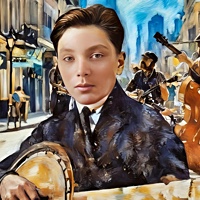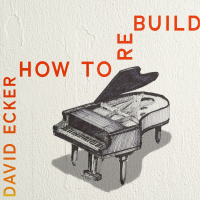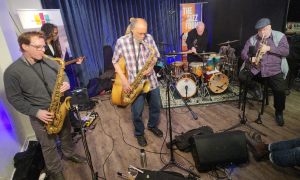Home » Jazz Articles » Live Review » Brad Mehldau Trio At National Concert Hall
Brad Mehldau Trio At National Concert Hall
Bending low over his keyboard, head cocked like an antenna awaiting signals, the pianist seemed both hypnotized and inspired—conduit and driver.
National Concert Hall
Perspectives
Dublin, Ireland
June 25, 2025
Brad Mehldau looked like a man at ease as he walked to his piano, turned and bowed graciously to the audience. For sure, Dublin's National Concert Hall is a familiar venue—he had played here at least four times previously since a solo performance in 2004. At the end of the day, however, it is probably just another well—appointed venue among many to the globe-trotting pianist. One suspects it was not so much the reception of the audience that seemed to comfort him, but simply the fact that he was in his most natural habitat—on stage, under spotlights.
Feeling at ease, both in himself and musically, has not come easy to the New Hampshire-raised Mehldau. In his autobiography, Brad Mehldau: Formation: Building A Personal Canon, Part One (Equinox Publishing, 2023), he candidly lays bare the insecurities that plagued him in his formative years. Musical insecurity was born of feeling the need to honor the jazz tradition—many of whose historical practitioners were still alive when Mehldau began hustling for gigs and tips in late-1980s New York—while burning to say something new.
Over the years, Mehldau has managed his musical dichotomy by compartmentalizing his wide-ranging musical interests: he has explored classical music as a solo pianist and performed song cycles; he unsheathed his prog-rock and electronic influences on Taming the Dragon (Nonesuch Records, 2014); and he has deep-dived into Americana with mandolinist Chris Thile. The ride has never been boring. More often than not, it has been exhilarating and edifying.
As this evening's performance bore witness, Mehldau's full-blooded pursuit of such different strands of music has fed into and refined his jazz trio's music significantly. His songbook spans a century, from Cole Porter to Radiohead. His language, a couple of centuries more. It is all grist to his mill.
From the first few bars of "August Ending"—with the unrelenting rhythmic churn of his left hand underpinning the right hand's stream-of-consciousness flow—it was clear that Mehldau relishes the yin and yang of structure versus untethered expression. Still, the bravura soloing à la Art Tatum that used to be part of the young Mehldau's bag was rationed to potent effect. Lyricism, tightly coiled at times, loose and aching at others, is more the currency these days.
To this end, Mehldau had terrific partners in bassist Felix Moseholm and drummer Jorge Rossy. Several Moseholm solo spots framed his unhurried singing approach to his instrument, but it was his keen awareness of his role within the trio—robust anchor and sharp-eared provocateur— that was consistently impressive. You could see him listening—his attention swaying from pianist to drummer and back again like the pendulum of a clock.
With Rossy, returning to the fold after a 20-year hiatus, Mehldau's musical understanding runs deep—it used to be the Mehldau-Rossy Trio way back in the day. In the aforementioned book Mehldau describes him as "a musician who happens to be a drummer... "; the Spaniard's painterly freedom—a mixture of pastel grace and earthy hues—felt understated yet undeniably central to the action. He warmed to the task on a lively version of Sam Rivers's "Beatrice," and on Mehldau's waltz—time "Angst"—all elegant composure and breathless exhilaration in turn.
It was probably no coincidence that having reconnected with Rossy, Mehldau chose to revisit some older repertoire. "Young Werther," drawn—like "Angst- -from Introducing Brad Mehldau (Warner Bros., 1995), may have flowered from Mehldau's love of German Romanticism, but this evening Mehldau drew in equal measure from the blues as the trio hit a swinging groove. Around the midway mark, Moseholm and Rossy laid out, leaving Mehldau to lead an undulating baroque 'n' blues path. When the trio reunited, all three musicians fanned the flames—forging a seamless pathway into a loose-limbed recalibration of Cole Porter's "From This Moment On."
For all the thrills of the trio's straight-ahead, post-bop adventure, the real magic resided in the slower tunes where Mehldau mined deep veins of lyricism. A sultry Latin reading of Leslie Bricusse' "When I Look In Your Eyes" was one such highlight, Mehldau's delicate, blues-laced ballad "Love is Fragile" another. Bending low over his keyboard, head cocked like an antenna awaiting signals, the pianist seemed both hypnotized and inspired—conduit and driver.
Elliott Smith's "Between The Bars" served as the first encore. After a wonderful solo from Moseholm, Mehldau steered the singer-songwriter's brittle lyricism into more dynamic, blues-flecked terrain. The crowd's enthusiasm brought the trio back from the wings to deliver "Annabelle"—a gentle swinger that ended a memorable set on a bright, uplifting note.
After all these years Mehldau seems to have come to terms with the fact that there is indeed nothing new under the sun, only different ways—even brilliant ways—to say the same thing.
Tags
Live Review
Ian Patterson
Ireland
Dublin
Brad Mehldau: Formation: Building A Personal Canon, Part One
New York
Taming the Dragon
Nonesuch Records
deep-dived into Americana
Chris Thile
Art Tatum
Felix Moseholm
Jorge Rossy
Sam Rivers
PREVIOUS / NEXT
Brad Mehldau Concerts
Mar
5
Thu
Brad Mehldau with the HR Big Band @ hr-Sendesaal
Hr-sendesaal - Hessischer RundfunkFrankfurt am Main, Germany
Mar
14
Sat
Mar
15
Sun
Support All About Jazz
 All About Jazz has been a pillar of jazz since 1995, championing it as an art form and, more importantly, supporting the musicians who make it. Our enduring commitment has made "AAJ" one of the most culturally important websites of its kind, read by hundreds of thousands of fans, musicians and industry figures every month.
All About Jazz has been a pillar of jazz since 1995, championing it as an art form and, more importantly, supporting the musicians who make it. Our enduring commitment has made "AAJ" one of the most culturally important websites of its kind, read by hundreds of thousands of fans, musicians and industry figures every month.


























